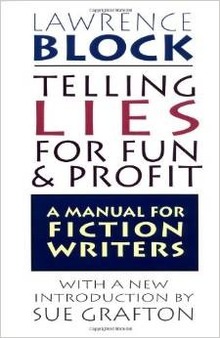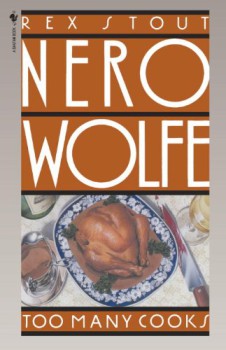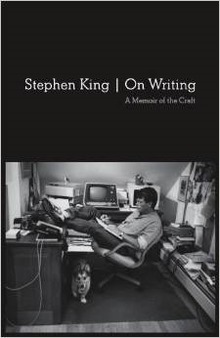Methodology: Not Just For Scientists Anymore
 I’ve been known, via Twitter and Facebook, to let people know how my writing is going. So I’m apt to say things like “chapter 16 is going feral on me, I need a net.” This prompts some of my writer friends to say “been there, done that” and others to say “you write in chapters?”
I’ve been known, via Twitter and Facebook, to let people know how my writing is going. So I’m apt to say things like “chapter 16 is going feral on me, I need a net.” This prompts some of my writer friends to say “been there, done that” and others to say “you write in chapters?”
This isn’t to say that they themselves don’t write in chapters, per se. What I think this particular friend actually meant is that she just writes, and lets the chapters appear where they may. After all, we know that, with very few exceptions, all novels end up being divided into chapters. Exactly when and how that division occurs is part of each individual’s methodology. Or perhaps the sensibilities of their editor.
And all advice on writing tells you the same thing: there’s no right or wrong way, there’s only the way that works for you.
I tend to work and think in chapters of about 25 to 30 pages, or somewhere between 5000 and 6000 words. Why? Because when I was starting to write my dissertation (don’t ask, you don’t want to know) the Chair of the Department gave me this advice: “Make your chapters about 25 pages long, Violette. No one wants to read longer ones.”
It took me a long time to write my dissertation (you’re still not asking) and I think I may have gotten into the 25-page habit. The work-in-progress is averaging a little longer, but I certainly don’t write chapters that are shorter than 25 pages. Still, as I said above, decisions on the lengths of chapters are sometimes made at the editorial level. My editor at DAW, Sheila Gilbert, has only changed my chapter length once. I couldn’t see that it made any significant difference one way or another, so I didn’t argue the point.
There’s really only one rule when it comes to where the chapter should end: it should be in a place that makes the readers want to keep on reading. Have you ever said to yourself “I’ll just read until the end of the chapter, and then I’ll go do . . . ” And then you’ve found yourself, hours and chapters later, still reading? That’s the way to do it.
 Last time I talked a little about word count, the gauge that practically every writer uses to measure their productivity on a day-to-day basis. There are, however, writers who are notorious for not doing it that way at all. Rex Stout, for example, customarily composed the whole book in his head, taking about 10 or 11 months, and then sat down and took about one month to type it out. Sure, I hear you saying, but the Nero Wolfe novels aren’t particularly long. Maybe so, but they sure are complicated.
Last time I talked a little about word count, the gauge that practically every writer uses to measure their productivity on a day-to-day basis. There are, however, writers who are notorious for not doing it that way at all. Rex Stout, for example, customarily composed the whole book in his head, taking about 10 or 11 months, and then sat down and took about one month to type it out. Sure, I hear you saying, but the Nero Wolfe novels aren’t particularly long. Maybe so, but they sure are complicated.
Still, most of us, as I’ve said, use a daily word count. It’s happened to me that my husband’s come home, the sun’s setting, and I’m still short of my word count for the day. What do I do? If I’m close, I ignore the clock and keep going. We’re grown-ups, there are no children in the house, and dinner can be postponed. If there’s no hope that I’ll make it? I’m a grown-up, I stop work for the day.
 It’s also happened that it’s not even lunch time, and I’ve already reached my word goal for the day. So here’s my question: what do you do when you’ve reached your word-count goal early? You’ll see from the comments to my last post that some people just keep going, no doubt on the “strike while the iron is hot” principle. Many people I know (including, often, myself) stop and use the unexpected free time for something else, no doubt on the “don’t press your luck” principle. The point is, what works for you, works for you.
It’s also happened that it’s not even lunch time, and I’ve already reached my word goal for the day. So here’s my question: what do you do when you’ve reached your word-count goal early? You’ll see from the comments to my last post that some people just keep going, no doubt on the “strike while the iron is hot” principle. Many people I know (including, often, myself) stop and use the unexpected free time for something else, no doubt on the “don’t press your luck” principle. The point is, what works for you, works for you.
Revising is a horse of a different colour. Revising throws the concept of word-count limits out of the window. When a book is being re-written, unless there’s extensive new material, word-count doesn’t work very well as a day-to-day goal. Here’s where people revert to putting in a certain number of hours, rather than a certain number of words.
But that’s not the important thing about revising, is it? Hmm. Maybe we’ll talk about that another time.
Violette Malan is the author of the Dhulyn and Parno series of sword and sorcery adventures, as well as the Mirror Lands series of primary world fantasies. As VM Escalada, she writes the soon-to-be released Halls of Law series. Visit her website www.violettemalan.com.
Two of my favorite books: love the illustrations for this one!
Not really a fan of King’s book…
Thanks Bob. Any excuse to include a Stout book! I prefer Block’s books to King’s myself. King’s is more like a bio with some writing advice than it is a book on writing per se.
I’m a BIG Shannara fan, but I remember being completely disappointed in Terry Brook’s book on writing. It was beyond light-weight.
Violette, as a fellow dissertation survivor, I know not to ask. I’ll just nod sympathetically and imagine that I’m offering you a cup of tea.
My dissertation director realized I was in trouble because my units of argument were too small. My idea of what to do with a paragraph had been warped by teaching undergrads, who rarely wrote anything longer than 10 pages. When I presented her with a chapter draft, my director said, “Structurally, you have written a tapeworm, whereas you need to write a whale. Each paragraph of this chapter contains a complete set of organs, but so miniaturized that it can’t do much, even when you string them all together. Organize the paragraphs into longer structures. Imagine you’re writing an organism whose liver is bigger than your car.” And I was driving a decades-old Volvo station wagon in those days — that’s a big liver. Eventually, I figured out how to do what she was trying to teach me to do. (That may be why the first novel I ever finished clocked in at an unpublishable 300,000 words.)
Bob, I agree that Brooks’s book on writing is relatively lightweight, but since I hadn’t really connected with the Shannara books, I had no expectations. It actually does a couple of things well that I don’t usually see in books about writing. Back when I wrote Black Gate’s column on teaching fantasy literature, I did a post on Brooks, which you can find here.
Sarah, what the dissertation did for me was make me very succinct, to the point where, with my first manuscript, my agent said to me “I’ve never said this to a client before; can you make it longer?”
I also never connected with Brooks, nor have I read his book on writing, but now I’m curious. As far as writing for Hollywood goes, I stick with William Goldman.